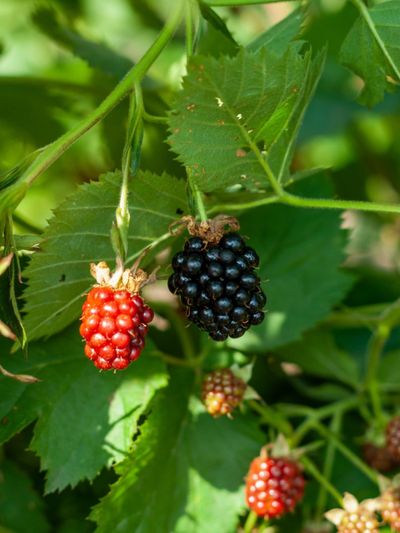Blackberry Bush Viruses Causes Blackberries Not Fruiting
If your blackberry plant looks healthy and blooms, but grows misshapen fruit or even no fruit at all, chances are that your blackberry plants are affected by one of many blackberry viruses. Some of these viruses include:
Blackberry Calico Blackberry/Raspberry Tobacco Streak Raspberry Bushy Dwarf Black Raspberry Streak
Unfortunately, most of these blackberry diseases will show almost no outward signs of infection on the blackberry plant other than to decrease the number of blackberry fruit found on the plant. In fact, some of these blackberry cane diseases can even make the plant grow bigger and faster. These diseases may also only affect one kind of blackberry variety and not another, so one variety of blackberry in a yard may fruit while another blackberry susceptible to that blackberry virus may not. The other unfortunate fact about blackberry viruses is that they cannot be cured. Once a blackberry bush is infected, it must be removed. However, you can take steps to make sure that your blackberry plants don’t end up with these diseases.
First, make sure that the blackberry plants you buy are certified virus-free. Second, keep wild blackberry brambles at least 150 yards (137 m.) away from domestic blackberry bushes, as many wild blackberry bushes carry these viruses.
Fungus Causing Blackberry Bush That Won’t Grow Berries
A fungus called Anthracnose can also cause blackberries not to fruit. This blackberry fungus can be spotted when the blackberry fruit will start to ripen but will wilt or turn brown before the berry is fully ripe. You can treat the blackberry bush with a fungicide and make sure to remove and dispose of any infected blackberry canes.
Pests Causing No Blackberries on a Blackberry Bush
Some pests like thrips, mites, and raspberry fruitworm beetles can also cause a fruiting problem with a blackberry plant. Check the bush carefully, particularly the undersides of leaves to see if the plant has unwanted insects. Treat the infested blackberry bushes with a pesticide to get rid of pests. Take caution, though. If you remove all insects from the blackberry bush, you may reduce the number of pollinators, which will also reduce the number of blackberries the bush produces.
Environmental Factors Keep Blackberries from Fruiting
Other factors like soil nutrients, heredity and the number of pollinators can also affect how well a blackberry bush fruits.
Soil – Have your soil tested to make sure that a healthy balance of nutrients is in the soil. Amend the soil if you find this is not the case. Lack of Pollinators – Limit the use of pesticides around the blackberry bushes to make sure that pollinators can get to the plants. Heredity – Make sure that you only purchase quality varieties from reputable nurseries. Wild or poor quality blackberry bushes can come from stock that simply cannot produce large, quality blackberry fruits.
